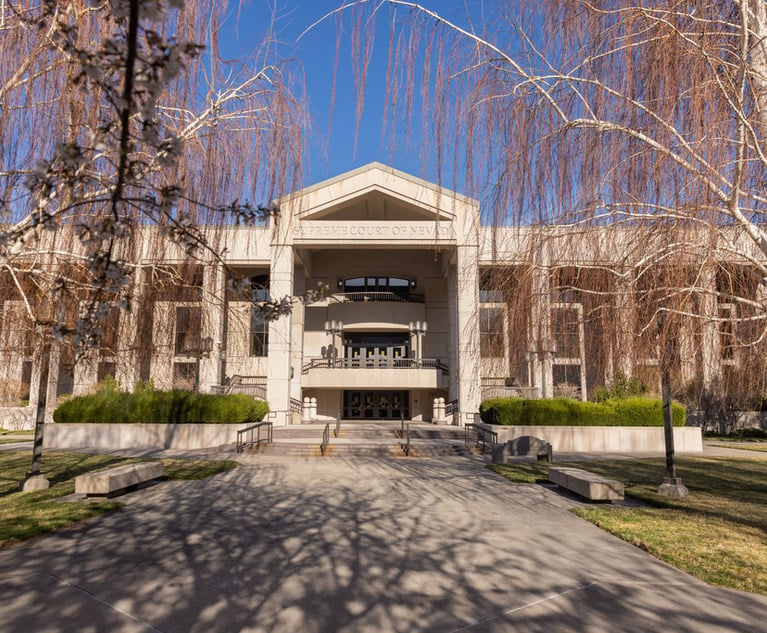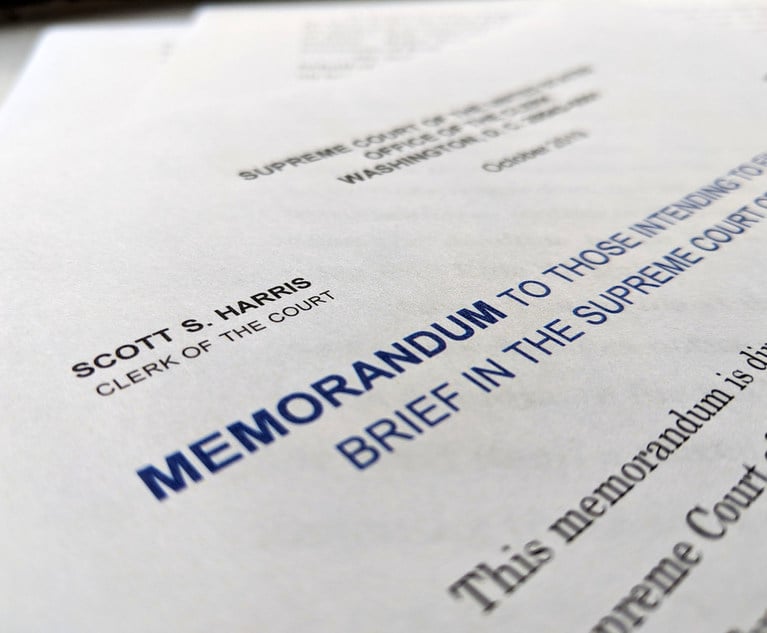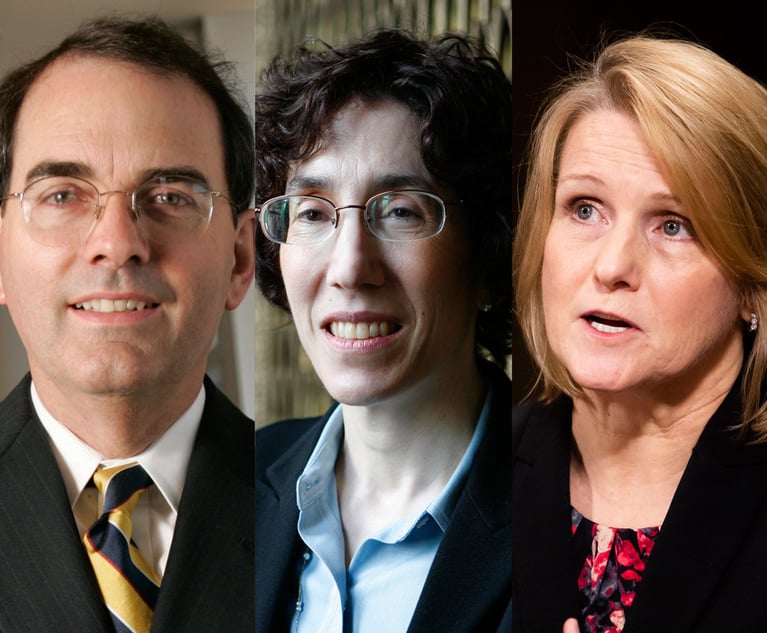 U.S. Supreme Court Chief Justice John G. Roberts, center, walks to the Senate Chamber at the start of the Trump impeachment trial Thursday. Credit: Diego M. Radzinschi / ALM
U.S. Supreme Court Chief Justice John G. Roberts, center, walks to the Senate Chamber at the start of the Trump impeachment trial Thursday. Credit: Diego M. Radzinschi / ALMWould Roberts Need to Recuse in Any Trump Suit Challenging Bolton?
Several legal scholars said they doubted federal courts would spend much time with an assertion of executive privilege from President Donald Trump arising in the context of impeachment. But any case that reaches the court could compel the chief justice to consider recusing.
January 28, 2020 at 03:31 PM
6 minute read
U.S. Supreme Court justices generally are reluctant to step aside from cases and leave their colleagues in potential deadlocks. But Chief Justice John Roberts Jr. may have little choice if President Donald Trump heads to court to restrict current or former administration officials from testifying at his impeachment trial.
Trump has suggested he may seek to assert executive privilege to protect the office of the presidency if his former national security adviser, John Bolton, is called on to testify at the ongoing Senate impeachment trial. The possibility of such a move has spurred considerable attention in recent days, as legal scholars weigh the novelty of an executive privilege claim arising in the context of impeachment.
"It's complicated," Mark Rozell of George Mason University, an executive privilege scholar, said in an interview. "We're in uncharted territory."
As Trump's legal team wraps up its trial presentation, attention is expected soon to focus on the possibility of witnesses, including Bolton, who has reportedly asserted in a draft manuscript that Trump told him he wanted to withhold military aid to Ukraine until leaders there announced investigations of Democrats. That claim undercuts Trump's contention that there is no witness directly saying Trump's squeeze on Ukraine was done for personal benefit. Trump's lawyers have denied he pressured Ukraine to help him politically.
There is some dispute about whether Roberts directly can order Bolton to appear to testify. Under Senate impeachment rules, Roberts has the authority to rule on evidentiary matters, which include documents and witness testimony. The Senate may overrule Roberts if there is an objection to his decision and a majority vote by the senators.
Under one scenario, any Bolton testimony is resolved within the Senate proceeding itself—he is either commanded to appear and testify, or he is not. Roberts may or may not play any role in that decision.
But under a different scenario, the Trump administration would take the whole dispute to court, arguing that executive privilege should outright prohibit Bolton from testifying. Such a case would play out in a trial court—and if one party presses it, possibly the Supreme Court itself.
That's where Roberts might have to weigh stepping aside, especially if he played any role in commanding Bolton to appear in the first place. In such a scenario, the justices would be weighing a decision that involved Roberts. In any evenly divided Supreme Court case, were an issue to so split the justices, a tie keeps in place the underlying federal appeals court decision.
"If Justice Roberts were to recuse himself, the country might face the specter of a Supreme Court deadlocked on the critical question of whether a sitting president undergoing an impeachment trial has the right to assert executive privilege to block witnesses at his own trial," Claire Finkelstein of University of Pennsylvania Carey Law School wrote in a recent New York Times op-ed.
Several legal scholars, speaking in interviews, said they doubted federal courts would spend much time with an assertion of executive privilege arising in impeachment. Some scholars have described the would-be claim as "weak," while others said courts would quickly want to avoid ruling on a "political" question best left to lawmakers to sort out.
Trump "would be asking a district judge and then perhaps the circuit to 'overrule' the chief while the Senate trial was on hold," said Stephen Gillers of New York University School of Law. Gillers said Roberts likely would recuse in any scenario where the justices are being asked to resolve whether or not he made a correct decision.
Michael Gerhardt of the University of North Carolina School of Law said: "Any effort to appeal just runs up against Walter Nixon v. United States, which increases the likelihood a court would treat it as a (nonjusticiable) political question."
Frank Bowman of the University of Missouri School of Law noted that the Framers intentionally did not want the Supreme Court to be the venue for matters of impeachment. The Framers, he said, were concerned an impeached official might subsequently be charged in criminal court and that case could work itself up to the very body that found him guilty or not guilty on impeachable conduct.
"Whether Roberts would feel obliged to disqualify himself—part of it might depend on procedurally how the claim would be postured," Bowman said. "My guess is Roberts would recuse himself for reasons of appearance, probably confident his colleagues have no desire to get into this at all."
Both scholars believe the courts would quickly dismiss any privilege appeal arising out of the impeachment trial as a political question committed to the other branches and so not justiciable.
Rozell offered four factors why a Trump privilege appeal in these circumstances was unlikely to succeed in the courts even if it got over the political question hurdle. First, Bolton is a private citizen, no longer a part of the Trump administration, Rozell said.
"Second, Bolton would presumably be asked questions about allegations of wrongdoing in the White House which are not protected by executive privilege," Rozell continued. "Third, he is going public. There is a manuscript in circulation so claiming privilege over publicly available information is extremely complicated. Fourth, the president himself has made utterances on Twitter on the very topic over which he would claim privilege, which ultimately makes his case weaker."
Executive privilege has never been considered an absolute privilege, said Rozell, and a balancing test has been used to determine if the privilege prevails. The need for information in an investigation into wrongdoing, he added, "strikes me as the most compelling circumstance weighing against a successful executive privilege claim here. The U.S. v. Nixon standard—while the cases are not exactly similar—does carry weight."
In the next few days, Roberts may be asked to reveal his own views on the privilege issue if he is pressed to issue a subpoena to Bolton.
This content has been archived. It is available through our partners, LexisNexis® and Bloomberg Law.
To view this content, please continue to their sites.
Not a Lexis Subscriber?
Subscribe Now
Not a Bloomberg Law Subscriber?
Subscribe Now
NOT FOR REPRINT
© 2024 ALM Global, LLC, All Rights Reserved. Request academic re-use from www.copyright.com. All other uses, submit a request to [email protected]. For more information visit Asset & Logo Licensing.
You Might Like
View All
Divided 5th Circuit Shoots Down Nasdaq Diversity Rules

Nevada Supreme Court to Decide Fate of Groundbreaking Contingency Cap Ballot Measure
5 minute read
Lawyers, Law Groups Oppose Proposal to Require Court Approval for Amicus Briefs

9th Circuit Judges Weigh if Section 230 Shields Grindr From Defective Design Claims
Trending Stories
- 1Orange Belongs to All: U-Haul Suit Argues Rival Public Storage Cannot Claim the Color
- 2Continuing Consolidation: The Biggest Legal Tech M&As of 2024
- 3FTC Announces HSR Final Rulemaking Impacting Premerger Filings
- 4NJ Cut Down on Open Judgeships in 2024, But Dozens of Vacancies Linger
- 5How to Add PR When You’ve Already Taken an ‘L’
Who Got The Work
Michael G. Bongiorno, Andrew Scott Dulberg and Elizabeth E. Driscoll from Wilmer Cutler Pickering Hale and Dorr have stepped in to represent Symbotic Inc., an A.I.-enabled technology platform that focuses on increasing supply chain efficiency, and other defendants in a pending shareholder derivative lawsuit. The case, filed Oct. 2 in Massachusetts District Court by the Brown Law Firm on behalf of Stephen Austen, accuses certain officers and directors of misleading investors in regard to Symbotic's potential for margin growth by failing to disclose that the company was not equipped to timely deploy its systems or manage expenses through project delays. The case, assigned to U.S. District Judge Nathaniel M. Gorton, is 1:24-cv-12522, Austen v. Cohen et al.
Who Got The Work
Edmund Polubinski and Marie Killmond of Davis Polk & Wardwell have entered appearances for data platform software development company MongoDB and other defendants in a pending shareholder derivative lawsuit. The action, filed Oct. 7 in New York Southern District Court by the Brown Law Firm, accuses the company's directors and/or officers of falsely expressing confidence in the company’s restructuring of its sales incentive plan and downplaying the severity of decreases in its upfront commitments. The case is 1:24-cv-07594, Roy v. Ittycheria et al.
Who Got The Work
Amy O. Bruchs and Kurt F. Ellison of Michael Best & Friedrich have entered appearances for Epic Systems Corp. in a pending employment discrimination lawsuit. The suit was filed Sept. 7 in Wisconsin Western District Court by Levine Eisberner LLC and Siri & Glimstad on behalf of a project manager who claims that he was wrongfully terminated after applying for a religious exemption to the defendant's COVID-19 vaccine mandate. The case, assigned to U.S. Magistrate Judge Anita Marie Boor, is 3:24-cv-00630, Secker, Nathan v. Epic Systems Corporation.
Who Got The Work
David X. Sullivan, Thomas J. Finn and Gregory A. Hall from McCarter & English have entered appearances for Sunrun Installation Services in a pending civil rights lawsuit. The complaint was filed Sept. 4 in Connecticut District Court by attorney Robert M. Berke on behalf of former employee George Edward Steins, who was arrested and charged with employing an unregistered home improvement salesperson. The complaint alleges that had Sunrun informed the Connecticut Department of Consumer Protection that the plaintiff's employment had ended in 2017 and that he no longer held Sunrun's home improvement contractor license, he would not have been hit with charges, which were dismissed in May 2024. The case, assigned to U.S. District Judge Jeffrey A. Meyer, is 3:24-cv-01423, Steins v. Sunrun, Inc. et al.
Who Got The Work
Greenberg Traurig shareholder Joshua L. Raskin has entered an appearance for boohoo.com UK Ltd. in a pending patent infringement lawsuit. The suit, filed Sept. 3 in Texas Eastern District Court by Rozier Hardt McDonough on behalf of Alto Dynamics, asserts five patents related to an online shopping platform. The case, assigned to U.S. District Judge Rodney Gilstrap, is 2:24-cv-00719, Alto Dynamics, LLC v. boohoo.com UK Limited.
Featured Firms
Law Offices of Gary Martin Hays & Associates, P.C.
(470) 294-1674
Law Offices of Mark E. Salomone
(857) 444-6468
Smith & Hassler
(713) 739-1250










